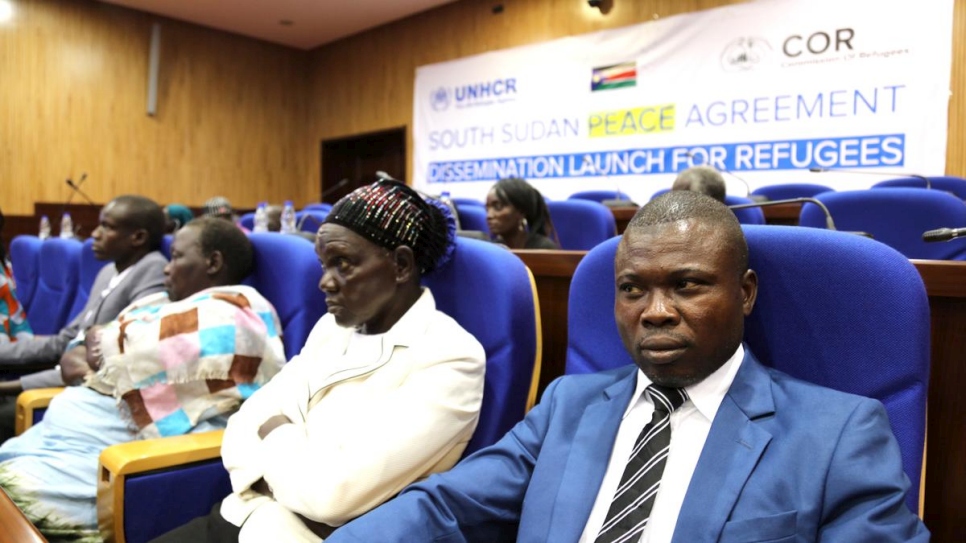Driven from his land by conflict in South Sudan, farmer Singira Mirihewari traveled for 18 hours to tell leaders negotiating peace in Sudan what millions of refugees like him need.
“We have suffered. We have been worst affected. The country is practically empty. Hardly anybody can stay there,” he said after arriving in the capital, Khartoum, from the Democratic Republic of the Congo (DRC) to meet face-to-face with parties involved in revived peace talks.
“If the leaders of South Sudan want us to go back, they have to first start by showing us that the peace is serious,” he added.
Since conflict erupted in South Sudan in 2013, some 2.5 million people like Singira have fled extreme violence, rights abuses and unimaginable suffering as refugees, while nearly two million others are internally displaced inside the world’s youngest country.
He is among 16 refugee representatives who traveled from the DRC, Central African Republic, Ethiopia, Kenya, Uganda and Sudan to share their views, hopes and expectations with leaders of political factions who negotiated a peace agreement in Khartoum late last month.
“We have suffered. We have been worst affected. The country is practically empty."
Known as the ‘Revitalised Peace Agreement,’ the accord promises the rights of refugees to return in safety and dignity to South Sudan, and to be given physical, legal and psychological protection.
It guarantees their right to return to their places of origin or to live in areas of their choice. It also protects their rights to citizenship and documentation. But some of the refugees who travelled to Khartoum are worried about South Sudan’s ability to deliver on those promises.
“We definitely want to go back. South Sudan is a rich country. We have everything, oil, gold, minerals. We can survive. But the leaders have to stop fighting,” said Margaret Wani Ambi, a 62-year-old grandmother of five.
Margaret travelled to the meeting from Bentiue, an informal refugee settlement on the outskirts of Khartoum, with over 24,000 inhabitants, with another delegate. She wanted to hear more details of how the peace agreement would be implemented, including a clear role for refugees themselves.
“I want to know the exact process of achieving peace. [Refugees] must have a say in the laws and in the structure of the country so there is no more war. We are outside the country but its our country and we have to have a role.”

South Sudanese refugee delegates Singira Mirihewari (right) and Cecilia Elia Ofowa (left) attend peace talks in Khartoum, Sudan. © UNHCR/Katharina Von Schroeder
For his part, Simon Marot Touloung, a married father of two who traveled from Uganda where he has lived since fleeing his home five years ago, wanted assurances from leaders that refugees would have a functional country to return to.
“During the meeting I explained to them that no refugee will go back to South Sudan until things are working. They will have to fix the roads, build schools, get the economy working again. The judiciary. Everything has to start over again and that is going to take a long time,” he said.
While many displaced were weary of living as refugees, he said: “We will not go back to suffer a worse life. None of our women will return because in Uganda at least they can feed their children … So I want to hear the plan to fix things. I will then go back to Uganda and tell other refugees what I heard.”
Peter Kuany Garang was a chief in his community of Renk in South Sudan when fighting broke out in 2014. Amid indiscriminate killing and maiming, he led 24,000 of his people on foot to the safety of White Nile State in Sudan, where he has been a refugee ever since.
“I explained to them that no refugee will go back to South Sudan until things are working."
“I came today. I listened. I heard. We heard about the deal. In the camp where we live in White Nile we celebrated. Refugees want peace. Refugees want to go back to South Sudan,” he said.
“But I am a bit sceptical about the other side. I am a bit sceptical about how committed they are to peace. But we are willing to try and see. If this peace deal works, we can go back to tomorrow.”
All parties to the agreement, from the government and opposition groups, were present at the meeting and listened to the views of refugees. They say they are serious about the role of refugees in the peace process, which they urged them to trust.
The Regional Refugee Co-ordinator and Special Adviser to the UN High Commissioner for Refugees for the South Sudan Situation, Arnauld Akodjenou, stressed the importance of refugee participation in the event.
“Refugee representatives in Khartoum will serve to remind the country’s leaders and the world of the human toll that continues every day there is not peace in South Sudan,” he said.
They "can also become strong peace advocates by spreading the word to refugee communities where they live, or upon return to South Sudan if they do decide to go back voluntarily.”
